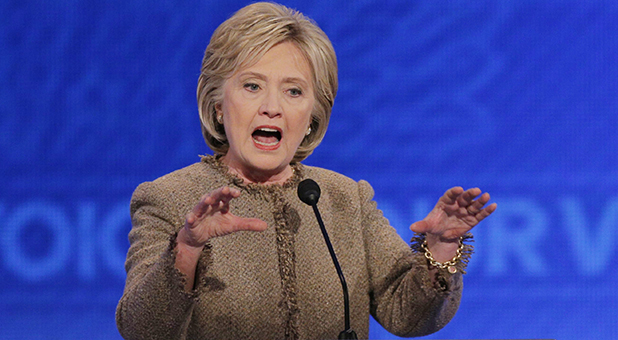Hillary Clinton Pledges to Seek a Cure For This Disease in 10 Years
NEW YORK (Reuters) – Democratic presidential candidate Hillary Clinton on Tuesday announced a slate of proposals to battle Alzheimer’s disease and seek a cure by 2025, including an increase in funding for research on the disease and related disorders.
Clinton called for a decade-long investment of $2 billion per year for research, which her campaign called a fourfold increase over last year’s $586 million.
“We owe it to the millions of families who stay up at night worrying about their loved ones afflicted by this terrible disease and facing the hard reality of the long goodbye to make research investments that will prevent, effectively treat and make a cure possible by 2025,” Clinton said in a statement.
Alzheimer’s is an irreversible, progressive brain disorder that eventually destroys the ability to carry out the simplest tasks. More than 5 million Americans are estimated to have the disease, which the National Institute on Aging said is the sixth leading cause of death in the United States.
On a conference call with reporters, the Clinton campaign noted the economic toll of Alzheimer’s for the country, pointing to finding treatment for the disease as a way to help ease future burdens for government health insurance programs Medicare and Medicaid.
A researcher on the call, Rudolph Tanzi of Harvard Medical School, also detailed the recent progress in medical research that has improved the chances for finding treatment or even a cure.
“Our single bottleneck has been funding,” he said, calling his area of research a “budget-constrained, not a knowledge-constrained field.”
The $2 billion also could include research on related dementias and pathologies, Tanzi said.
Clinton, the front-runner for her party’s nomination for the November 2016 presidential election, was to discuss her plan on Tuesday in an appearance in Fairfield, Iowa.
A cure for Alzheimer’s also could provide some relief for caregivers, including the so-called sandwich generation – people providing care for their children and their parents at the same time.
About 15 percent of middle-aged people are helping financially support both an aging parent and a child, according to the Pew Research Center. Older parents are likelier to need caregiving of some kind.
Clinton, the former secretary of state, has made boosting the middle class a centerpiece of her campaign and she has often spoken on the campaign trail about meeting supporters who are struggling to care for family members with Alzheimer’s.
For more on the 2016 presidential race, see the Reuters blog, “Tales from the Trail” (http://blogs.reuters.com/talesfromthetrail/).
(Reporting by Luciana Lopez; Additional reporting by Jonathan Allen; Editing by Bill Trott)
© 2015 Thomson Reuters. All rights reserved.














































